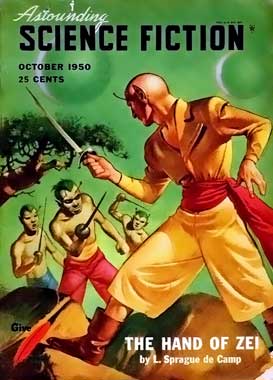

Ici la page amazon.fr du roman grand format La Saga de Zeï (collection Trésors de la S-F)
The Search For Zei (1950)
Traduction du titre original : à la recherche de Zei.
Autres titres : The Floating Continent (le continent flottant) ; Hand Of Zei part 1 (la main de Zei) ; Viagens Interplanetarias (cycle) ; Krishna 2 (serie).
Sorti aux USA de octobre 1950 à janvier 1951 dans le magazine Astounding Science Fiction.
Sorti aux USA en 1963 chez ACE BOOKS (poche, les deux parties Search For Zei et Hand of Zei imprimées dos à dos).
Sorti en France en 1971 chez OPTA (Galaxie Bis numéro 22/88, traduction de Michel Rivelin)
Sorti en France le 30 octobre 1975 chez LE MASQUE FR (traduction de Michel Rivelin)
Sorti en France le 9 juillet 2009 chez BRAGELONNE (trésor de la SF, traduction de Michel Rivelin et Collin Delavaud)
De L. Sprague de Camp (Lyon Sprague de Camp).
Résumé à venir.
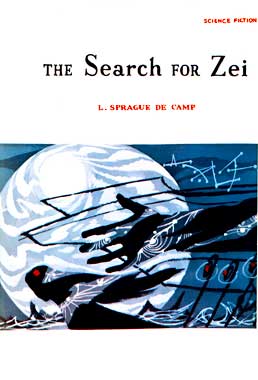
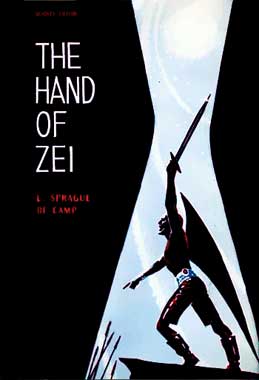
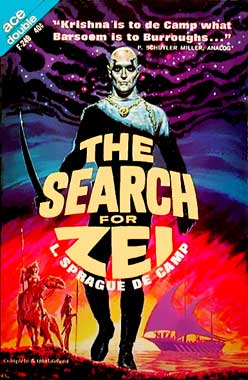
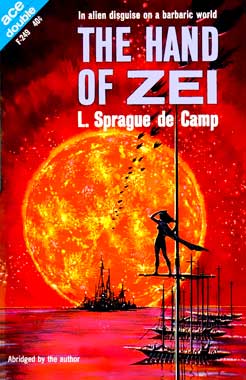
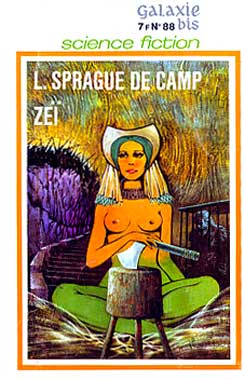
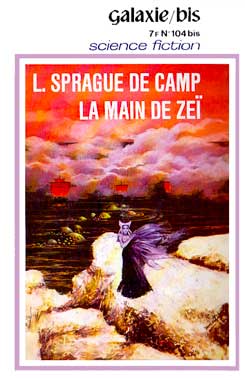
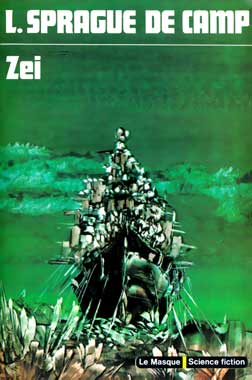
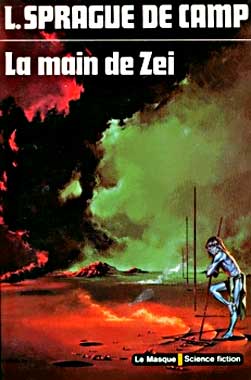
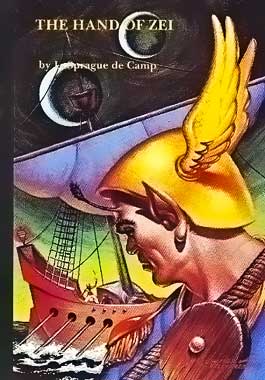

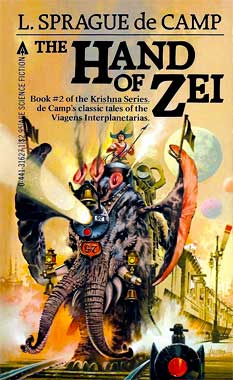
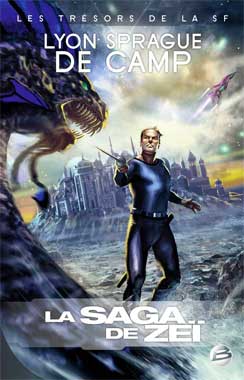
***
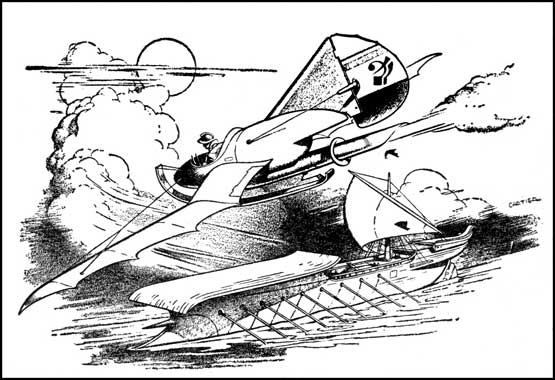
(traduction au plus proche, la version 1962)
Dirk Barnevlelt voûta son grand corps aux allures de Caribou sur sa machine à écrire et rédigea:
A vingt-cinq degrés nord de l'équateur sur la planète Krishna s'étend la Mer Benjao,le plus grand volume d'eau sur cette planète. Et dans cette Mer se trouve le Sungar, le pays de légende et de mystère.
Là-bas, sous les rayons torride du soleil brûlant haut, les galères crochues de Dour et les vaisseaux de charge ventrus de Jaz-Mourien pourrissaient lentement prises au piège implacable d'un vaste continent de liane marine Terpahla. Même les violents orages subtropicaux Krishniens ne faisaient guère plus qu’ébouriffer la surface de cet immense marécage flottant - lequel, quoi qu'il en soit, parfois se soulevait et crevait sous les coups de l'affreuse vie marine de la planète, tel le Gvam, ou Harponneur.
Barnevelt se renfonça dans son siège pour se demander: cela faisait deux années qu'il écrivait au sujet des lieux que Igor Shtain avait exploré; verrait-il jamais un seul d'entre eux? Si sa mère mourrait... Mais c'était peu probable. Avec la gériatrie moderne, elle pourrait tenir bon un siècle de plus. Il avait encore un arrière-arrière grand-père en vie aux Pays-Bas. Par ailleurs, il réalisa, avec mauvaise conscience, que ce n'était pas une façon de penser à sa mère. Il reprit :
Rien, une fois pris dans cette toile d'araignée d'algues folles, ne pouvait s'en échapper, à moins de pouvoir s'envoler...
***
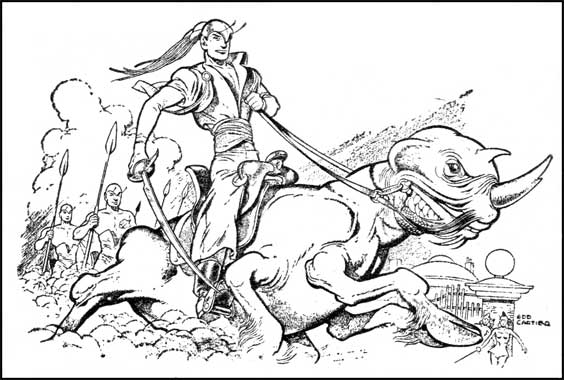
(texte original, la version de 1962)
Dirk Barnevelt hunched his mooselike form over his typewriter and wrote:
Twenty-five degrees north of the equator on the planet Krishna lies the Banjao Sea, the largest body of water on this planet. And in this Sea is found the Sunqar, home of legend and mystery.
Here under the scorching rays of the hot high sun, the beaked galleys of Dur and the tubby roundships of Jaz-murian slowly rot in the unbreakable grip of a vast floating continent of the terpahla sea vine. Even the violent storms of the Krishnan sub-tropics no more than ruffle the surface of this immense floating swamp— which, however, sometimes heaves and bubbles with the terrible sea life of the planet, such as the gvam or harpooner.
Barnevelt sat back to wonder: For a couple of years he'd been writing about the places that Igor Shtain explored; would he ever see any of them? If his mother died… But that was unlikely. With modern geriatrics she'd be good for another century. He still had a great-great-grandfather alive in the Netherlands. Besides, he thought guiltily, that was no way to think about one's mother. He resumed:
Nothing, once caught in this web of weed, can escape unless it can fly like the aqebats that wing over from the mainland to prey on the smaller sea life of the Sunqar. Here time means nothing; nothing exists save silence and heat and the stench of the strangling vine.
At least, thought Barnevelt, this hack writing was better than trying—as he had once tried—to ram the glories of English literature down the unwilling throats of rural adolescents with only two interests: sex, and escape from the toils of the public school system.
To the heart of this forbidding place Igor Shtain, most celebrated of living explorers, plans to penetrate on his forthcoming Krishnan expedition, to clear up once and for all the sinister rumors that for years have issued from this undiscovered country.
***
(Traduction de Michel Rivelin)
1
Dirk Barnevelt enleva la housse de sa machine à écrire et se mit au travail :
A quelque vingt-cinq degrés au nord de l'équateur de Krishna s'étend la Mer Banjao, la plus grande étendue d'eau de la planète. Là se cache le Sunqar, empire de légende et de mystère. Sous les rayons torrides de Roqir pourrissent lentement les galères pointues de Dur et les trirêmes ventrues de Jazmurian, prises dans l'étreinte impitoyable de ce vaste continent flottant, mi-aquatique, mi-végétal.
Même les violents orages qui sévissent dans cette partie de la planète arrivent à peine à rider la surface de cet immense marécage glauque. Pourtant, parfois, apparaît un bouillonnement sinistre qui révèle la présence des monstres qui règnent en maîtres incontestés des profondeurs, le plus redoutable étant le gvàm, autrement appelé le harponneur.
Barnevelt s'adossa confortablement contre son siège et laissa errer son imagination : il y avait déjà deux ans qu'il décrivait laborieusement les endroits explorés par Igor Shtain; les verrait-il un jour? Peut-être si sa mère mourait... Mais cela était peu probable. Grâce aux progrès de la gériatrie moderne, elle pouvait tenir le coup pendant encore un siècle. Son arrière-arrière grand-père, qui habitait les Pays-Bas, était bien vivant. Et puis, pensa-t-il coupablement, ce n'est pas ainsi qu'un homme doit penser à sa mère. Il reprit son récit:
Rien, une fois pris dans cette toile d'herbes et de racines, ne peut s'en échapper. Seul ce qui vole...
***
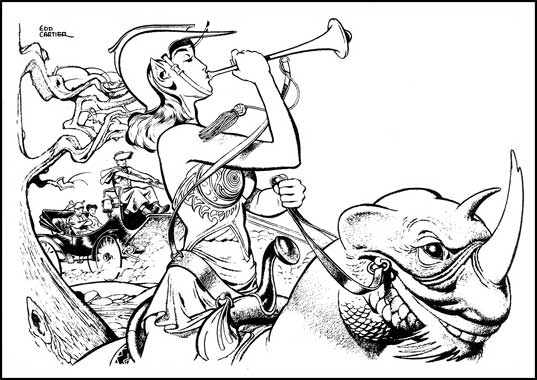
(traduction au plus proche, la version magazine de 1950)
Dirk Barnevlelt voûta son grand corps aux allures de Caribou sur sa machine à écrire et rédigea:
A vingt-cinq degrés nord de l'équateur sur la planète Krishna s'étend la Mer Benjao, le plus grand volume d'eau sur cette planète. Et dans cette mer se trouve le Sungar, le pays de légende et de mystère.
Là-bas, sous les rayons torride du soleil brûlant haut, les galères crochues de Dour et les vaisseaux de charge ventrus de Jaz-Mourien pourrissaient lentement prises au piège implacable d'un vaste continent de liane marine Terpahla. Même les violents orages subtropicaux Krishniens ne faisaient guère plus qu’ébouriffer la surface de cet immense marécage flottant - lequel, quoi qu'il en soit, parfois se soulevait et crevait sous les coups de l'affreuse vie marine de la planète, tel le Gvàm, ou Harponneur.
Barnevelt se renfonça dans son siège pour se demander: cela faisait deux années qu'il écrivait au sujet des lieux que Igor Shtain avait exploré; verrait-il jamais un seul d'entre eux? Si sa mère mourrait - Mais c'était peu probable. Avec la gériatrie moderne, elle pourrait tenir bon un siècle de plus. Il avait encore un arrière-arrière grand-père en vie aux Pays-Bas. Par ailleurs, il réalisa, avec mauvaise conscience, que ce n'était pas une façon de penser à sa mère. Il reprit :
Rien, une fois pris dans cette toile d'araignée d'algues folles, ne pouvait s'en échapper, à moins de pouvoir s'envoler...
***
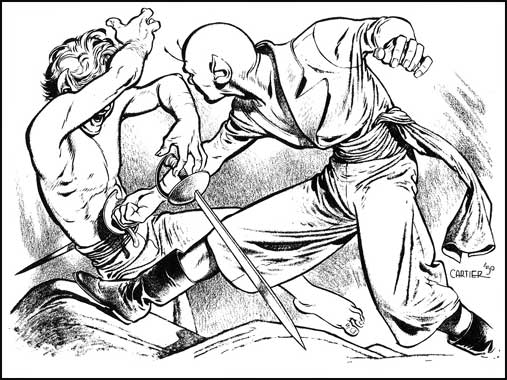
(texte original, la version de 1950)
Dirk Barnevelt hunched his mooselike form over his typewriter and wrote:
Twenty-five degrees north of the equator on the planet Krishna lies the Banjao Sea, the largest body of water on this planet. And in this sea is found the Sunqar, home of legend and mystery.
Here under the scorching rays of the hot high sun, the beaked galleys of Dur and the tubby roundships of Jaz-murian slowly rot in the unbreakable grip of a vast floating continent of the terpahla sea vine. Even the violent storms of the Krishnan sub-tropics no more than ruffle the surface of this immense floating swamp— which, however, sometimes heaves and bubbles with the terrible sea life of the planet, such as the gvàm or harpooner.
Barnevelt sat back to wonder: For a couple of years he'd been writing about the places Shtain explored; would he ever see any of them? If his mother died - But that was unlikely. With modern geriatrics she'd be good for another century. He still had a great-great-grandfather alive in the Netherlands. Besides, he thought guiltily, that was no way to think about one's mother. He resumed:
Nothing, once caught in this web of weed, can escape unless it can fly like the aqebats that wing over from the mainland to prey on the smaller sea life of the Sunqar. Here time means nothing; nothing exists save silence and haze and heat and the stench of the strangling vine.
At least, thought Barnevelt, this hack writing was better than trying—as he had once tried—to ram the glories of English literature down the unwilling throats of rural adolescents with only two interests: sex, and escape from the toils of the public school system.
To the heart of this forbidding place Igor Shtain, most celebrated of living explorers, plans to penetrate on his forthcoming Krishnan expedition, to clear up once and for all the sinister rumors that for years have issued from this undiscovered country.
***

